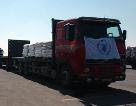
Hana Levi Julian Barak Opens Gaza Crossings
Defense Minister Ehud Barak caved in to pressure from international organizations and ordered the IDF to open the Gaza Crossings on Friday, despite continued rocket and mortar fire from the region aimed at Jewish communities in southern Israel.. Forty truckloads of medical supplies, rice, sugar, flour, and other basic food commodities began to make their way through the Kerem Shalom Crossing around 8:00 a.m. Friday morning. Another 40 truckloads of grains were being transferred into Gaza through the conveyor terminal at the Karni Crossing. And approximately 400,000 liters of heavy-duty diesel fuel is being pumped into the region through the Nahal Oz terminal to keep the Gaza power station going. Palestinian Authority medical patients are being allowed to enter Israel through the Erez Crossing for treatment at Israeli hospitals as well.
Five of the trucks were donated by Egypt, and 20 others were sent by various international humanitarian aid organizations, including UNRWA (U.N. Relief and Works Agency for Palestine Refugees in the Near East) and the International Association of the Red Cross (IARC). The remainder, said IDF Major Peter Lerner, Defense Ministry Coordinator for Government Activities in the Territories, came from the "private sector" -- dairy products ordered by Gaza business owners from Israeli manufacturers. "Businessmen don't hate us," he commented. "Business is just that: business. People buy and sell on both sides of the barrier."
Gaza terrorists meanwhile continued to fire mortars and rockets at Jewish communities in southern Israel, which in the past has forced closure of the crossings in retaliation for the attacks.
Overnight and in the wee hours of Friday morning, at least 25 mortar shells peppered the western Negev, with at least one of the shells exploding in the center of a town in the Eshkol region, damaging a building. Fortunately, the structure was empty at the time. There were no reports of casualties.
Earlier Thursday night, a medium-range Grad-type Katyusha rocket was fired at the port city of Ashkelon. TNo one was injured in that attack, and there were no reports of damage. At least five other missiles were fired at the western Negev earlier in the day, in addition to several mortar attacks.
According to Lerner, most of the pressure has come from UNRWA. The Red Cross has also pressured Israel to buckle in the face of what it claims is a looming humanitarian crisis in Gaza, despite its own failure to ascertain the condition of kidnapped IDF soldier Gilad Shalit, held captive by Hamas since June 2006.
"So far the crossings are scheduled to be open," Lerner told Israel National News, late Thursday night, "but if there is more rocket fire as there was the other day, we may have to close them."
'A Drop in the Ocean'
"This is not going to change the strategic standing point of Gaza," Lerner noted. "It's a drop in the ocean," given the fact that the crossings have been closed for the past 10 days. "We have to keep in mind that the amount that goes in is not enough to meet the daily needs," he said. "Think about it: 80 trucks for a population of 5 million," he said. "It's enough to feed the region for a day, perhaps two. The situation there at the moment is very, very fragile."
Although Israel considers the ruling Hamas terrorist organization responsible for everything that goes on in Gaza, said Lerner, there are international organizations that are actively intervening. He also said they are complaining bitterly, particularly UNRWA, which has stopped distributing food in Gaza altogether, because it is missing some of the key items that are normally included in the packages.
Israel agreed to the shipment, he said, because there is a difference between Hamas and its victims, the PA Arabs living under its control -- many of whom, he contended, are not part of the terrorist infrastructure. "We have nothing really wrong with the Palestinian population, but because of Hamas, everyone is paying. We don't want to really extend [the conflic beyond the Hamas leadership."
Lerner pointed out that "despite what went on (a reference to the shelling absorbed by southern Israel overnight -ed.) the crossings are open today. But if the rocket fire continues, the crossings could be closed earlier," he added.
On Tuesday evening, Barak ordered the IDF to open the crossings the next day, but he was forced to rescind the order a few hours later in the face of a barrage of rockets launched against Israel from Gaza. The overnight volley was only a harbinger of more to come: by Wednesday night, dozens of rockets and mortars had rained down upon the western Negev. The day after, on Thursday, more than 60 missiles followed suit.
No comments:
Post a Comment